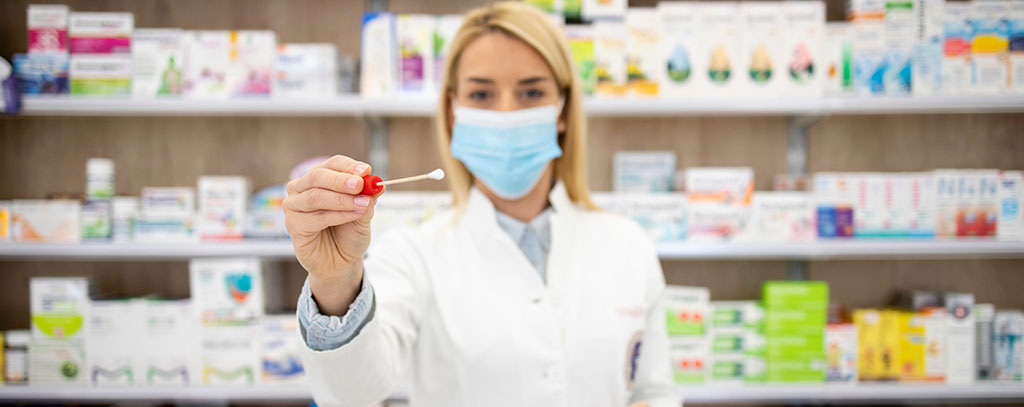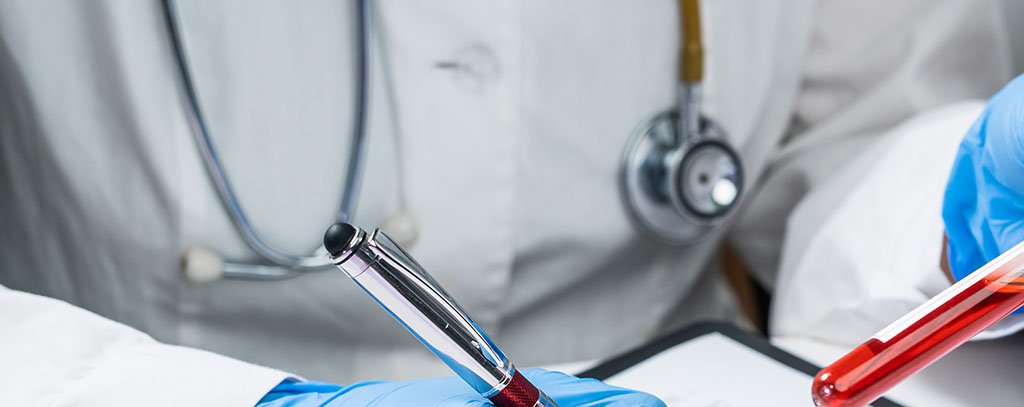


Saliva Drug Tests for Employers: Comprehensive Guide
May 20, 2023


What Does an 8 Panel Drug Test Test For? Comprehensive Guide
May 21, 2023Saliva drug testing for pre-hiring screening has become more common amongst employers due to its unobtrusive nature and convenience. In this blog post, we will examine the advantages and disadvantages of using saliva drug tests for pre-employment screening, as well as exploring their ability to detect different substances with varying detection times and cut-off levels.
We will discuss the types of drugs that can be detected using mouth swab drug tests, including detection times and cut-off levels for different substances. Furthermore, we'll delve into the collection and processing procedures involved with oral fluid testing to ensure accurate results.
In addition to examining the accuracy and reliability factors associated with saliva tests, we will also explore validation studies that support their effectiveness in detecting illicit drug use. Lastly, our discussion will cover legal considerations surrounding pre-employment screening with saliva drug tests – encompassing applicable laws, employer obligations, and employee rights during the testing process.
By understanding these aspects of saliva drug tests for pre-employment screening, companies can make informed decisions about implementing an effective workplace substance abuse prevention program.
Table of contents
- The Importance of Pre-Employment Drug Screening
- Reducing Workplace Accidents and Injuries
- Improving Employee Productivity and Morale
- Saliva Drug Tests vs Urine Drug Testing
- Complying with Federal & State Regulations on Workplace Drug Testing
- Oral Fluid Testing Advancements in Employee Screenings
- Implementing Saliva Drug Tests in Your Workplace
- Frequently Asked Questions Saliva Drug Tests for Pre-Employment Screening
- Conclusion
The Importance of Pre-Employment Drug Screening
Implementing pre-employment drug screening is crucial for maintaining a safe and productive work environment. By detecting traces of substances in potential employees, companies can reduce the risk of accidents, absenteeism, and other issues related to substance abuse. This section will discuss the benefits of saliva drug tests as part of an effective workplace drug testing program.
Reducing Workplace Accidents and Injuries
One major advantage of conducting saliva drug tests during the hiring process is that it helps prevent workplace accidents caused by substance abuse. According to a study conducted by the National Safety Council (NSC), employees who use illicit drugs are more likely to be involved in on-the-job accidents than their sober counterparts (source). Implementing oral fluid testing can help identify job candidates with recent drug use history, thus reducing risks associated with impaired workers.
- Safety: A safer work environment leads to fewer injuries and fatalities.
- Cost Savings: Reduced accident rates translate into lower insurance premiums and less money spent on worker's compensation claims.
- Better Reputation: Companies known for prioritizing safety attract higher-quality job applicants and retain top talent more effectively.
Improving Employee Productivity and Morale
In addition to enhancing safety measures within your organization, saliva-based pre-employment screenings also contribute positively towards employee productivity levels and overall morale among staff members. When individuals know they're working alongside colleagues free from illicit substances, it fosters trust and collaboration within teams, ultimately leading to higher job satisfaction rates across the board.
Furthermore, by implementing a workplace drug testing program, employers can:
- Deter employees from using drugs in the first place due to fear of detection and potential consequences.
- Identify workers who may be struggling with substance abuse issues and provide them with resources for treatment and recovery support.
- Encourage a culture of healthiness, wellbeing, and accountability among all personnel.
Incorporating saliva drug tests into your pre-employment screening process is an effective way to ensure that you're hiring responsible individuals committed to maintaining a safe and productive work environment. By taking these proactive measures now, companies can avoid costly problems down the line while fostering a positive atmosphere conducive to long-term success and growth for their organization overall.
Drug testing before hiring is an essential part of any workplace safety program, as it can reduce the amount of incidents and injuries that occur while also increasing worker efficiency and satisfaction. Saliva drug tests offer several advantages over traditional urine testing methods that make them an attractive option for employers seeking reliable results.
Saliva Drug Tests vs Urine Drug Testing
When it comes to pre-employment screening methods, saliva drug tests offer several advantages over traditional urine testing. This section will compare these two types of tests by examining their accuracy rates, detection windows for various substances (such as marijuana/THC), and ease-of-use factors like tampering resistance or direct observation requirements during sample collection procedures.
Accuracy Rates Between Saliva Tests and Urine Tests
Studies have shown that saliva drug tests can be just as accurate as urine drug tests in detecting the presence of illicit drugs. In fact, oral fluid testing has been found to provide a more reliable indication of recent substance use compared to urine testing. Saliva samples offer more dependable results than urine tests since they are less susceptible to dilution or tampering.
Detection Window Differences for Common Drugs
- Marijuana: Saliva drug tests can detect THC within minutes after consumption and up to 24 hours after last use, while urine tests typically have a longer detection window ranging from days to weeks depending on frequency of use.
- Cocaine: Both mouth swab drug tests and urine drug tests can detect cocaine metabolites within hours after ingestion; however, oral fluid testing may provide slightly shorter detection periods than those seen with urine analysis.
- Opiates: Oral fluids tend to show opiate usage sooner than what's observed through urinalysis but also clear out faster making them ideal candidates when looking at recent substance abuse incidents rather than long-term patterns such as chronic opioid addiction cases where multiple days worth of evidence would need to be collected.
Tampering Resistance in Oral Fluid Testing
One of the main advantages of saliva drug tests over urine testing is their resistance to tampering. Since oral fluid samples are collected under direct observation, it is much more difficult for individuals to cheat or adulterate their sample compared to urine testing, where privacy concerns often prevent direct observation during collection. This makes oral fluid drug testing a more reliable option for employers looking to conduct drug testing programs and maintain a substance-free workplace.
Overall, saliva drug tests offer a reliable and accurate alternative to urine testing for pre-employment screening. Employers can guarantee adherence to both federal and state laws on workplace drug testing by being familiar with SAMHSA guidelines for such programs.
Complying with Federal & State Regulations on Workplace Drug Testing
It is essential that employers adhere to federal and state regulations when conducting pre-employment screenings using mouth swab drug tests or any other method. This section will provide information about relevant guidelines set forth by the Substance Abuse & Mental Health Services Administration (SAMHSA) along with tips ensuring compliance throughout every stage from implementing policies, training managers, proper procedure enforcement techniques within your organization.
Understanding SAMHSA Guidelines for Workplace Drug Testing Programs
The SAMHSA guidelines serve as a comprehensive resource for private employers looking to implement workplace drug testing programs. These guidelines outline various aspects of an effective program, including:
- Selecting a certified lab testing facility for confirmation testing.
- Hiring qualified medical review officers (MROs) to interpret test results.
- Incorporating post-accident testing and reasonable suspicion procedures into company policy.
- Maintaining confidentiality during the entire process, from sample collection to result reporting.
It is imperative that companies stay informed of any modifications in regulations and modify their policies accordingly to ensure compliance with these guidelines. Employers should also consult legal counsel if they have questions regarding specific requirements in their jurisdiction or industry sector.
Ensuring Compliance at Both Federal and State Levels
In addition to following SAMHSA recommendations, companies must also be aware of applicable state laws governing workplace drug testing. While some states closely align with federal standards, others may have more stringent requirements or additional restrictions on certain testing methods, such as oral fluid drug testing.
For example, some states require that employers follow specific protocols for conducting reasonable suspicion and post-accident testing, while others mandate the use of a particular lab or medical review officer. To ensure compliance with workplace drug testing regulations, employers should regularly review applicable federal and state laws.
To maintain a compliant workplace drug testing program, consider taking the following steps:
- Regularly review federal and state laws related to drug testing in the workplace.
- Update company policies and procedures accordingly based on any changes in legislation or industry best practices.
- Educate managers about their responsibilities when it comes to enforcing these policies and administering tests effectively.
- Maintain open communication channels with employees regarding expectations surrounding substance abuse prevention efforts within the organization.
By staying informed about regulatory updates and implementing robust internal processes, companies can confidently conduct saliva drug tests as part of their pre-employment screening process while remaining fully compliant at both federal and state levels.
To ensure compliance with federal and state regulations, employers must be aware of the guidelines surrounding workplace drug testing. Moving on, oral fluid testing has become a popular advancement in employee screenings due to its accuracy and convenience.
Oral Fluid Testing Advancements in Employee Screenings
As technology advances, so do the methods used to detect recent substance use among job candidates and current workers alike. One such development includes oral fluid testing, which offers better detection rates compared to traditional urine analysis approaches. In this segment, we'll explore how new SAMHSA guidelines establish standards and technical requirements for collection devices while highlighting their benefits over existing techniques.
The Science Behind Oral Fluid Testing
Oral fluid testing, also known as saliva drug tests or mouth swab drug tests, is a non-invasive method of detecting drugs in an individual's system by analyzing their oral fluids. The process involves collecting a small sample of saliva from the person being tested using specialized collection devices that are designed to absorb the oral fluids quickly and efficiently.
This type of test can detect various illicit drugs, including marijuana (THC), cocaine, amphetamines, methamphetamines, opiates, benzodiazepines, and more. Oral fluid testing has gained popularity due to its ability to provide accurate results within minutes after sample collection without requiring any invasive procedures like blood draws or urine samples.
Advantages of Using Oral Fluids for Detecting Recent Drug Use
- Ease-of-use: Saliva drug tests are easy-to-administer with minimal training required for managers or medical review officers responsible for conducting workplace drug testing programs.
- Tamper-resistant: Unlike urine tests where individuals may attempt adulteration or substitution during sample collection procedures (source), oral fluid testing is less susceptible to tampering since the sample collection process can be directly observed without compromising privacy.
- Detection window: Oral fluid tests are effective in detecting recent drug use, typically within a few hours up to several days after consumption. This makes them ideal for post-accident testing or reasonable suspicion situations where employers need immediate results.
- Fewer false positives: Saliva drug tests have been shown to produce fewer false-positive results compared to urine drug testing due to their ability to detect parent drugs rather than metabolites (source). This means that individuals who have consumed certain medications or foods that may cause a false positive on a urine test are less likely to encounter this issue with oral fluid testing.
- Compliance with regulations: As mentioned earlier, SAMHSA guidelines provide clear standards and requirements for lab testing and confirmation procedures when using saliva drug tests as part of workplace drug screening programs. By adhering to SAMHSA guidelines, private employers can ensure their pre-employment screenings are compliant with federal and state laws.
Incorporating oral fluid testing into your company's pre-employment screening process not only provides an efficient method for detecting recent substance abuse but also helps maintain compliance with relevant regulations while minimizing the risk of potential legal issues related to improper workplace drug testing practices.
Oral fluid testing has revolutionized pre-employment drug screening, allowing employers to quickly and accurately detect recent drug use. With the right provider, implementing saliva tests into your workplace can be a straightforward process that ensures compliance with state regulations.
Implementing Saliva Drug Tests in Your Workplace
Before implementing saliva drug tests in your workplace, it is essential to understand the necessary steps and proper implementation of such a process. This section will provide guidance on selecting a reliable testing provider, training managers on proper procedures, and updating workplace policies accordingly.
Choosing a Compliant Drug Testing Provider
Selecting the right drug testing provider is crucial for ensuring accurate results and maintaining compliance with federal and state regulations. When evaluating potential providers, consider the following factors:
- Accreditation: Choose a laboratory that is accredited by reputable organizations such as College of American Pathologists (CAP), or follows guidelines set forth by the Substance Abuse & Mental Health Services Administration (SAMHSA) to ensure high-quality standards are met.
- Experience: Look for providers with extensive experience in oral fluid drug testing specifically, as well as expertise in handling various types of substance abuse cases.
- Tech-savvy approach: Opt for companies that utilize advanced technologies like electronic chain-of-custody forms and digital reporting systems to streamline processes while reducing human error risks associated with manual paperwork handling.
- Certified medical review officers (MROs): Ensure that your chosen provider employs MROs who can accurately interpret test results while adhering to confidentiality requirements under applicable laws such as HIPAA or ADA regulations where relevant.
Training Managers on Administering Saliva Tests Effectively
Proper training is essential for managers who will be responsible for administering saliva drug tests. This includes understanding the correct procedures, as well as recognizing potential signs of tampering or attempts to cheat the test. To ensure effective implementation, consider:
- Providing comprehensive training materials: Equip your managers with detailed instructions on how to administer oral fluid testing correctly, including guidelines on sample collection and storage.
- Conducting hands-on demonstrations: Arrange practical sessions where managers can practice administering saliva tests under expert supervision before implementing them in real-life situations.
- Ongoing support and resources: Offer continuous access to educational materials such as webinars or online courses that cover updates in drug testing regulations and best practices within the industry.
Updating Workplace Policies Accordingly
To successfully integrate saliva drug tests into your pre-employment screening process, it's crucial to update your company's workplace policies accordingly. This involves clearly outlining expectations surrounding substance abuse prevention while ensuring compliance with federal and state laws governing workplace drug testing programs. Key steps include:
- Drafting a clear policy statement: Create a written document detailing your organization's stance on substance abuse prevention along with specific information about the use of mouth swab drug tests during pre-employment screenings.
- Incorporating legal requirements: Ensure that all relevant federal, state, and local regulations are considered when drafting your updated policy. This may involve consulting legal counsel experienced in employment law matters related to drug testing and substance abuse prevention programs.
- Communicating changes effectively: Inform employees, candidates, and stakeholders about any updates made to your workplace policy regarding saliva drug tests. Ensure that all parties understand their rights and responsibilities under the new guidelines.
Frequently Asked Questions Saliva Drug Tests for Pre-Employment Screening
What can be detected in a saliva test?
Saliva drug tests can detect various substances, including marijuana (THC), cocaine, amphetamines, methamphetamines, opioids such as morphine and codeine, phencyclidine (PCP), benzodiazepines, barbiturates, and alcohol. The detection times for these drugs vary depending on factors like usage patterns and individual metabolism rates.
Why do companies do a saliva drug test?
Companies use saliva drug tests for pre-employment screening because they are non-invasive, easy to administer, cost-effective and provide quick results. These tests help employers maintain a safe work environment by identifying potential substance abuse issues among job applicants before hiring them.
What drug test is most common for pre-employment?
The most common type of pre-employment drug testing is the urine test due to its longer detection window compared to saliva tests. However, some employers prefer using oral fluid testing because it's less invasive and harder to cheat than urine testing.
What is a disadvantage of oral fluid testing?
A major disadvantage of oral fluid testing is its shorter detection window compared to other methods like urine or hair analysis. This means that recent substance use may be identified but not past usage beyond 24-48 hours in most cases which could lead to false-negative results if an applicant has abstained from drugs just prior to the test.
Conclusion
Saliva tests for drugs are becoming more commonplace in pre-hiring evaluations, due to their hassle-free nature and uncomplicated implementation. They can detect a wide range of drugs, have relatively short detection times, and require minimal equipment for collection. Nevertheless, employers should bear in mind the potential accuracy and reliability issues associated with saliva drug tests.
In conclusion, saliva drug tests offer many benefits for pre-employment screening but also have some limitations that need to be considered before implementing them in the workplace. Employers must be certain to abide by all relevant regulations when utilizing these tests. For reliable and accurate saliva drug testing supplies, visit Halux Diagnostic.





